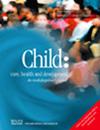Caregiver Peer Support for Families of Autistic Children in France
Abstract
Background
Caring for autistic children presents significant emotional and practical challenges, impacting family well-being and creating a need for social supports. In France, these challenges are compounded by historical reliance on psychoanalytic approaches to autism care. This study aims to identify caregiver peer support programmes for families of autistic children in France and explore their contributions to autism care.
Methods
An environmental scan was conducted to identify relevant caregiver peer support programmes. This approach involved an internet search using keywords related to autism, caregiver peer support and France, supplemented by informal consultations in the autism support community to contextualize findings and refine the identification of programmes. Inclusion criteria focused on services offering ongoing support to caregivers by peers. Data extraction was performed on publicly available sources and through direct correspondence with service administrators.
Results
Sixteen organizations were identified, offering various forms of caregiver peer support, including group meetings and individual follow-ups. Most services were in-person, with some online options. Peer support roles varied between paid and volunteer positions. Few organizations reported offering training to peers. Key support formats included informal gatherings like discussion groups focusing on emotional support, sharing experiences and advocacy. However, inconsistencies in the availability of detailed information about services and peer training highlight limited clarity in programme descriptions, which may pose challenges for families seeking support.
Conclusions
Caregiver peer support is underdeveloped in France. Insufficient detail regarding service delivery models, support structures and training hinders broader accessibility and adoption. Aligning terminology and promoting the value of caregiver peer support could enhance its role in autism care. Future research should evaluate the impact of these programmes on caregiver and family outcomes and explore stakeholder experiences to refine support mechanisms.
Summary
- Caregiver peer support for autism is underdeveloped in France. Despite its recognized value in improving family well-being, these services remain limited and inconsistently implemented across the country.
- Many programmes lack peer support training for caregivers, highlighting opportunities to improve the quality and sustainability of the support provided to families of autistic children.
- There is significant variation in how caregiver peer support services are offered, ranging from informal gatherings to individualized support, with a recent shift towards professionalizing the role of peer supporters.
- Standardizing terminology, promoting caregiver expertise and researching programme outcomes could enhance the impact of caregiver peer support on family well-being and autism care in France.
- The unique challenges and developments in France's caregiver peer support system offer valuable insights into the broader processes and evolution of peer support on a global scale.

 求助内容:
求助内容: 应助结果提醒方式:
应助结果提醒方式:


